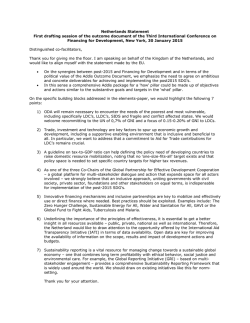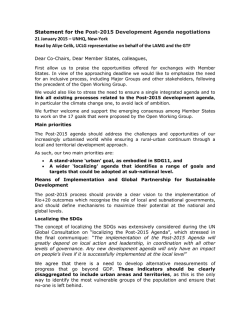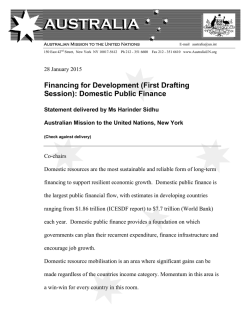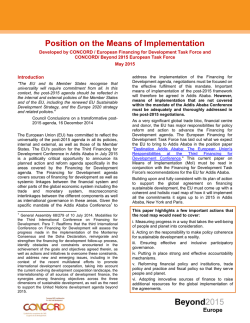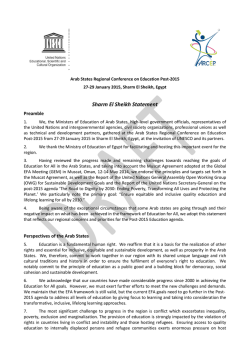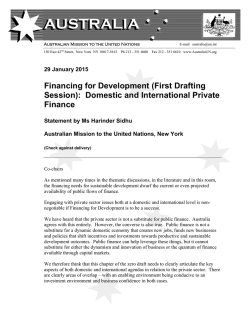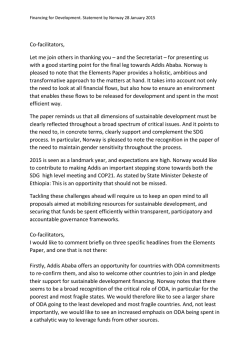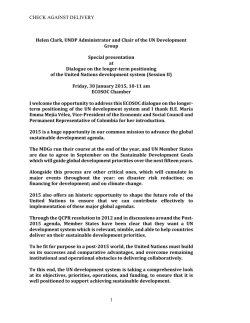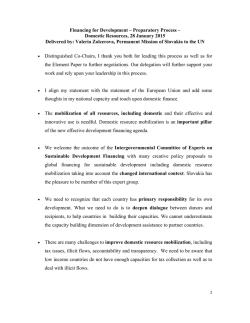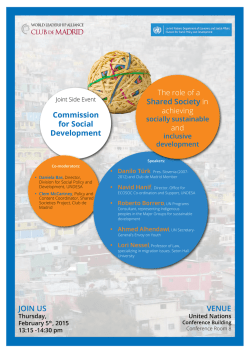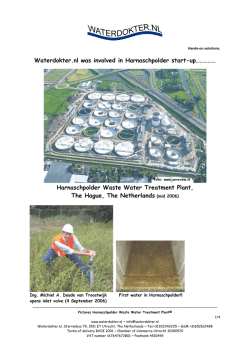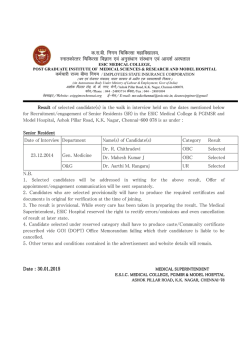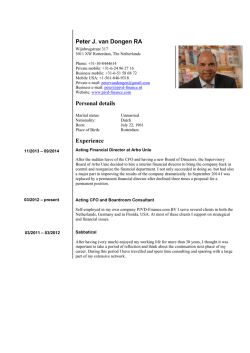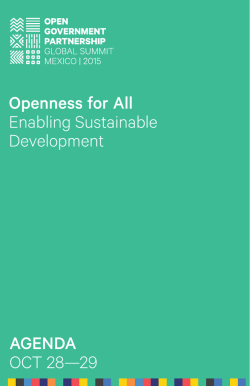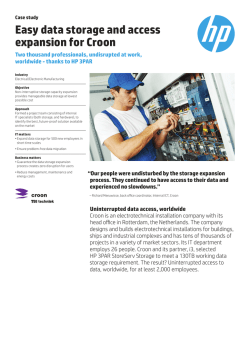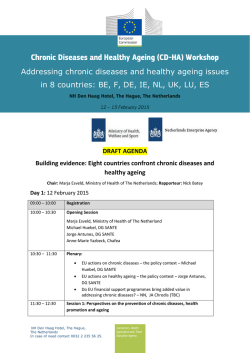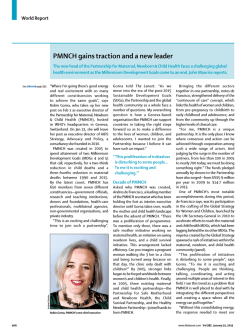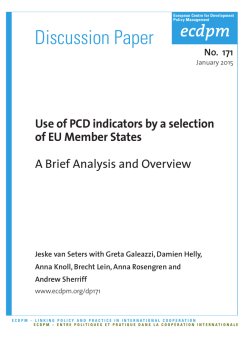
Netherlands Statement First drafting session of the outcome
Netherlands Statement First drafting session of the outcome document of the Third International Conference on Financing for Development, New York, 28 January 2015 I am speaking on behalf of the Kingdom of the Netherlands, and would like to align myself with the statement made by the EU. We would like to thank the co-facilitators and the UN-secretariat for the detailed elements-paper. The Secretary-General starts his synthesis report by making a universal call to action to transform our world beyond 2015. The credibility of the post-2015 Sustainable Development Goals (SDG’s) falls or stands with the means available to implement them. With the Third International Conference on Financing for Sustainable Development in front of us, we should take this opportunity to set out concrete actions for realizing this transformative shift towards a sustainable planet and life in dignity for all. The existing building blocks provided by the Monterrey Consensus and Doha Declaration, as well as the Outcome Document of the Open Working Group, the report of the Intergovernmental Expert Committee on Sustainable Development Financing (ICESDF) and the synthesis report of the Secretary-General are useful focal points in preparation for Addis. I recall that we compared the post-2015 framework with a house, with a roof - the political declaration, two interconnected pillars - the goals and targets resembling the 'what' and the Means of Implementation resembling the 'how', and a foundation - monitoring and accountability. The package coming out of Addis should be plug-and-play, meaning that it would in effect constitute the Means of Implementation pillar of the post-2015 sustainable development framework. Alignment, synergy and integration with the post-2015 Means of Implementation is crucial. I should note here that while the Means of Implementation and the Global Partnership are not necessarily the same thing, we do believe they belong together in one and the same pillar. The Global Partnership embodies a spirit of universal solidarity and cooperation, a mindset of shared responsibility. The Means of Implementation are the measures and actions that flow from that mindset. We believe that we can learn from the MDG’s by designing a coherent and comprehensive pillar for implementation to deliver on all of the goals and targets. Such a package could radiate more ambition than the currently SDG 17 and the 62 Means of Implementation action of the Open Working Group Outcome Document. To comment on the elements-paper in general, we would like to highlight the following six guiding principles: First, universality is key, in other words the Means of Implementation should embed collective action by all stakeholders involved, reflecting present-day realities and leaving space to national circumstances. Together we have a common and joint responsibility to deliver on the post-2015 SDG’s at all levels, from local to national, regional and international. Second, the Means of Implementation should respond to a multidimensional agenda that includes social, economic and environmental aspects and addresses peace, justice and the rule of law. Third, using a broad scope of financial and non-financial means is indispensable. We would put specific attention to the following: - Bearing in mind that vulnerable groups, such as the SIDS, LDCs, LLDCs and fragile and conflict affected states are very dependent on external public resources, we would welcome a reaffirmation of the international ODA-norm of 0,7% of GNI, including a focus of 0,15-0,20% of GNI to LDC’s. - But we need more development finance, “the cake should and can be increased” by domestic resource mobilization, including fight illicit financial flows, start new partnerships, innovate the financing mechanisms, catalyze the private sector and leverage MDBs for example by increasing the latter’s lending base for MICs. - The preconditions to increase the cake are known and not impossible to get in place, such as: good financial governance including strengthened debt management, a stable and transparent enabling business environment, conducive trade and investment policies, and sharing technological expertise. The Netherlands will continue to provide assistance in these fields if requested. So summing up the first three guiding principles for the Netherlands are: universality, multidimensionality and the need to use for all means available. Three more to go: The Fourth principle, the Means of Implementation need to be based on a multi-actor approach, including all stakeholders involved, e.g. the private sector, civil society, philanthropic organizations, academia and local parliaments, with every stakeholder taking responsibility for its own share. The Zero Hunger Challenge, GAVI, Every Women Every Child and Sustainable Energy for All are valuable examples of the impact of an inclusive partnership approach. Firth, the Means of Implementation should be inclusive, realistic and measurable. We should increase transparency of our efforts, both in terms of commitments to implement the new agenda as in results on achieving the SDG’s. Finally, governments and international institutions should implement consistent and coherent policies in line with SDG’s, focusing primarily on country ownership and effectiveness. I believe that if we have that, we can make a deal in 2015 on financial and non-financial means to implement and achieve the SDGs. We must therefore acknowledge the support new partners and new donors can give. We should all be willing to break through our old polarized positions. The Netherlands is willing to do so. Thank you for your attention.
© Copyright 2026
